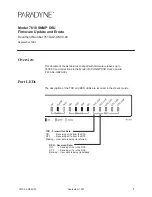
Publication date:Oct., 2012
Revision A2
189
Method:
This determines the method a port uses to aggregate with other ports.
None:
A port does not want to aggregate with any other port should
choose this default setting.
LACP:
A port use LACP as its trunk method to get aggregated with other
ports also using LACP.
Static:
A port use Static Trunk as its trunk method to get aggregated with
other ports also using Static Trunk.
Group:
Ports choosing the same trunking method other than “None” must be
assigned a unique Group number (i.e. Group ID, valid value is from 1 to
8) in order to declare that they wish to aggregate with each other.
Active LACP:
This field is only referenced when a port’s trunking method is LACP.
Active:
An Active LACP port begins to send LACPDU to its link partner right
after the LACP protocol entity started to take control of this port.
Passive:
A Passive LACP port will not actively send LACPDU out before it
receives an LACPDU from its link partner.
Aggtr:
Aggtr is an abbreviation of “aggregator”. Every port is also an aggregator,
and its own aggregator ID is the same as its own Port No. We can regard
an aggregator as a representative of a trunking group. Ports with same
Group ID and using same trunking method will have the opportunity to
aggregate to a particular aggregator port. This aggregator port is usually
the port with the smallest Port No. within the trunking group.
Status:
This field represents the trunking status of a port which uses a trunking
method other than “None”. It also represents the management link status
of a port which uses the “None” trunking method. “---“ means “not ready”
Summary of Contents for 065-7851
Page 1: ......
Page 2: ......
Page 62: ...Publication date Oct 2012 Revision A2 60 Fig 3 12 ...
Page 101: ...Publication date Oct 2012 Revision A2 99 Fig 3 34 ...
Page 104: ...Publication date Oct 2012 Revision A2 102 Fig 3 37 Fig 3 38 Fig 3 39 ...
Page 105: ...Publication date Oct 2012 Revision A2 103 Fig 3 40 Fig 3 41 ...
Page 106: ...Publication date Oct 2012 Revision A2 104 Fig 3 42 ...
Page 121: ...Publication date Oct 2012 Revision A2 119 Fig 3 61 Set up VLAN Tag Priority Mapping ...
Page 122: ...Publication date March 2011 Revision A1 120 Fig 3 62 Set up VLAN Tag Priority Mapping Finish ...
Page 136: ...Publication date Oct 2012 Revision A2 134 Fig 3 69 Frame Type Fig 3 70 ...
Page 137: ...Publication date Oct 2012 Revision A2 135 Fig 3 71 Fig 3 72 Fig 3 73 ARP ...
Page 138: ...Publication date Oct 2012 Revision A2 136 Fig 3 74 ARP Fig 3 75 ARP Fig 3 76 ARP Fig 3 77 ARP ...
Page 139: ...Publication date Oct 2012 Revision A2 137 Fig 3 79 ARP Fig 3 80 ARP Fig 3 81 ARP ...
Page 141: ...Publication date Oct 2012 Revision A2 139 Fig 3 87 ARP Fig 3 88 IPv4 ...
Page 145: ...Publication date Oct 2012 Revision A2 143 Fig 3 103 IPv4 Fig 3 104 IPv4 Fig 3 105 IPv4 ...
Page 146: ...Publication date Oct 2012 Revision A2 144 Fig 3 106 IPv4 Fig 3 107 IPv4 Fig 3 108 IPv4 ...
Page 147: ...Publication date Oct 2012 Revision A2 145 Fig 3 109 IPv4 Fig 3 110 IPv4 Fig 3 111 IPv4 ...
Page 148: ...Publication date Oct 2012 Revision A2 146 Fig 3 112 IPv4 Fig 3 113 IPv4 Fig 3 114 IPv4 ...
Page 149: ...Publication date Oct 2012 Revision A2 147 Fig 3 115 IPv4 Fig 3 116 IPv4 Fig 3 117 IPv4 ...
Page 150: ...Publication date Oct 2012 Revision A2 148 Fig 3 118 Action Fig 3 119 Rate Limiter ...
Page 151: ...Publication date Oct 2012 Revision A2 149 Fig 3 120 Port Copy Fig 3 121 DMAC Filter ...
Page 250: ...Publication date Oct 2012 Revision A2 248 Fig 4 1 Fig 4 2 ...
















































